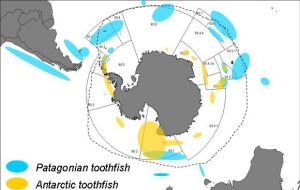MercoPress. South Atlantic News Agency
US retailers stop selling Antarctic toothfish
 Approximate distributions of Antarctic and Patagonian toothfish in the Southern Ocean
Approximate distributions of Antarctic and Patagonian toothfish in the Southern Ocean Three major US retailers announced that they have pledged not to stock endangered Antarctic toothfish. According to an article published by the environmental science and conservation news site, mongabay.com, Safeways, Wegmans and Harris Teeter have announced that they will not source fish coming from the Ross Sea.
The Antarctic toothfish is famous for producing antifreeze glycoprotein that allows it to survive in the ice cold waters of the Southern Ocean surrounding Antarctica.
These large fish and have been caught in waters deeper than 2000 metres. Fully grown, they are among the biggest in the Antarctic. Adults of more than two metres in length and weighing over 135 kg (298 lbs) have been caught by New Zealand researchers working in the Ross Sea.
The Ross Sea, the deep bay of the Southern Ocean in Antarctica between Victoria Land and Marie Byrd Land, has been called “the world's last ocean” due to its pristine state, largely untouched by the fishing industry.
However, over the last 15 years New Zealand commercial fisheries have entered the Ross Sea, seeking to fish the slow-growing Antarctic toothfish, which is later sold as the high-end Chilean sea bass, especially in the US market.
Conservation groups are seeking support to get the Ross Sea protected status and environmental organizations, such as Greenpeace, have begun a campaign to get retailers to steer clear of stocking endangered Antarctic toothfish.
Karli Thomas with Greenpeace says that “the delicate balance of the fragile Ross Sea is now under threat from commercial fishing.”
In 2010, Greenpeace added the Antarctic cod to its seafood Red List.
The Greenpeace International Seafood Red List is a list of fish that are commonly sold in supermarkets around the world, and which have a very high risk of being sourced from unsustainable fisheries.”
In a press release Thomas said, “Although technology has made it possible, it is simply not sustainable to be fishing every last corner of our ocean. The Ross Sea is a special place that we should be protecting as the home to diverse and unique wildlife, and a refuge in the face of climate change - not exploiting it to feed the wealthy.”
Nick Tozer – Buenos Aires




Top Comments
Disclaimer & comment rulesCommenting for this story is now closed.
If you have a Facebook account, become a fan and comment on our Facebook Page!